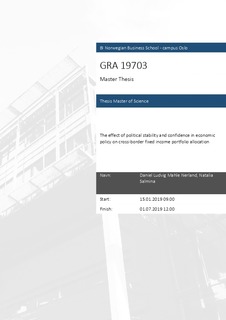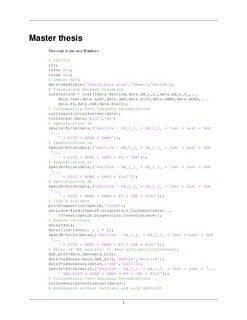| dc.contributor.author | Nerland, Daniel Ludvig Mahle | |
| dc.contributor.author | Salmina, Natalia | |
| dc.date.accessioned | 2019-10-11T07:44:03Z | |
| dc.date.available | 2019-10-11T07:44:03Z | |
| dc.date.issued | 2019 | |
| dc.identifier.uri | http://hdl.handle.net/11250/2621493 | |
| dc.description | Masteroppgave(MSc) in Master of Business - Handelshøyskolen BI, 2019 | nb_NO |
| dc.description.abstract | This thesis investigates the extent of home bias in bond portfolios in 20
countries, in the time period 2001 to 2016. In additional to traditional drivers
of portfolio optimization, we consider the impact of the financial crisis,
political stability and economic policy on cross-border fixed income
allocation. The thesis is mainly based on data from the Coordinated
Portfolio Investment Survey by the International Monetary Fund and Ifo
World Economic Survey. In our investigation of home bias, we find a
declining trend throughout the period. We find that the strongest drivers of
cross-border bond portfolio allocation are rational portfolio optimization
factors, the degree of underweight and diversification benefits. These results
indicate that investors aim to reallocate their portfolio and close the distance
between actual weights and optimal weights following the International
Capital Asset Pricing Model to achieve a diversified portfolio. We find a
significant negative relationship between cross-border bond portfolio
holdings and political stability, and a significant positive relationship
between cross-border bond portfolio holdings and confidence in economic
policy. | nb_NO |
| dc.language.iso | eng | nb_NO |
| dc.publisher | Handelshøyskolen BI | nb_NO |
| dc.subject | business | nb_NO |
| dc.title | The effect of political stability and confidence in economic policy on cross-border fixed income portfolio allocation | nb_NO |
| dc.type | Master thesis | nb_NO |

